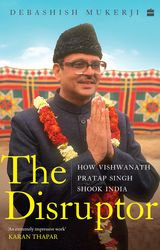His reign began with one crisis, and ended with another—not personal or political crises, but national crises that changed not only the discourse of Indian politics, but the polity itself.
The crisis that opened V.P. Singh’s short-lived reign was the kidnapping of the Union home minister’s daughter by a bunch of Kashmiri militants. Till then India had been steadfastly refusing to compromise with terror and blackmail. In fact, the Indian state had acquired a muscular image during the 1970s and even the 1980s, having split Pakistan into two, defied the world with a nuclear test, avenged the Ravindra Mhatre killing by hanging Maqbool Butt, sent the Army twice to smoke out militants from the Golden Temple and intervened in the Maldives to restore an ousted president.
The Rubaiya kidnapping and the manner in which VP’s government compromised with the kidnappers changed all that. India suddenly began to look not only weak but also supine. Though the preceding decade had been one of religious terror in Punjab, it had remained largely a provincial problem, and the state had only replied to bullet with bullet. Now, the state suddenly began to look not just soft, but also spongy, seeking compromises rather than solutions. Governance began to look like attempts to defuse crises rather than pursuing policies. VP’s tenure ended with one such crisis finally blowing up when one of the outside supporters of the coalition, the BJP, pulled the rug over the Ayodhya issue.
All the same, it would look incredible today that the man who thus presided over the weakest regime also did leave certain deep and constructive imprints on the polity and the way it is governed. As commerce minister he resumed trade with China that had remained suspended since 1962. As finance minister he boldly raided India’s corporate honchos, and ordered a “private”probe into an arms deal in which he knew his prime minister’s name would get involved. His Mandal proclamation, by which he offered a few thousand government jobs to backward castes, created a new ruling elite through what he himself once described as Mandal raj.
In fact, he even scored a few brilliant foreign policy achievements—he repaired the damage that had been done to relations with Nepal during Rajiv Gandhi’s tenure; deftly shifted four army divisions from the China border to the Pakistan border; brought back a bleeding Indian army from Sri Lanka without much loss of prestige; and presided over history’s biggest ever evacuation of civilians from a war zone. The massive airlift of Indians from Iraq and Kuwait is often compared with the Dunkirk evacuation during World War II.
The span of this book is not confined to VP’s prime ministerial tenure alone. This is a total biography tracing the evolution of an enigmatic politician from his semi-princely boyhood through his electoral battles, his brief tenures as chief minister of UP, in the ministries of commerce, finance and defence, his prime ministership, and till his failed rajguru role in the Janata Parivar in the late 1990s.
Written by veteran journalist Debashish Mukerji after extensive interviews with VP himself, as well as his close aides, kin, friends and foes, the book chronicles all these decisions and developments in minute detail. The narration is incredibly fast-paced and anecdote-laced. The political and human factors that were working behind the scenes are not only identified, but also explained with empathy. At the same time, the author also takes care not to get carried away by that empathy. A must-read for anyone interested in the modern political history of India.
Perhaps, there is one miss: the book is silent on the rise of Kanshi Ram and his Bahujan Samaj in north Indian politics. That is surprising, considering that it was the Allahabad by-election, where they fought one another, that proved to be the turning points in the political careers of both the Mandal messiah and the modern Bahujan messiah.
The Disruptor: How Vishwanath Pratap Singh Shook India
By Debashish Mukerji
Published by HarperCollins
Pages 543, price Rs699


